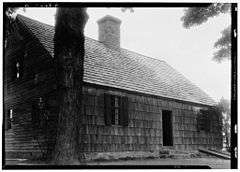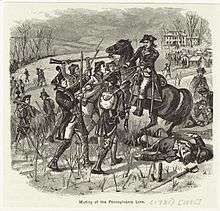Temperance Wick
Temperance Wick, known as "Tempe", (October 30, 1758 - April 26, 1822) was an American Revolutionary War heroine of Morristown, Morris County, New Jersey, United States.
| Wick House | |
|---|---|
 Wick House | |
| General information | |
| Type | House |
| Architectural style | Colonial |
| Town or city | Morristown, New Jersey |
| Country | United States |
| Construction started | 1745 |
| Designations | National Park Service |
Background
Born on her father's farm in Morris County, New Jersey, the youngest of Mary Cooper and Henry Wick's five children, she was likely named for her fraternal grandmother. Very little is known of her youth, but at the age of 21, she was the last of the Wick children living at home with her elderly parents. That winter, known as The Hard Winter, due to its unprecedented severity, over ten thousand soldiers of the Continental Army encamped upon her father's 1400 acre property in Jockey Hollow. Major General Arthur St. Clair and his staff rented quarters in the Wick house. Tempe and her parents apparently occupied two rooms on one side while two rooms opposite were let to the General, while the kitchen was likely shared. Her father Henry was a patriot who served in the Morris County cavalry as a captain. He also allowed Washington's army to winter on his land the next year, during that winter of 1780-81 the First Pennsyslvania Brigade under General "Mad" Anthony Wayne was encamped.[1] During the army's winter in Morristown, supplies for the large force put great burdens on the community. The troops were poorly clothed and fed, many had to go barefoot in the snow. In the field north of the Wick House is the burial site of 100 soldiers who died that winter in the brigade hospital, a dirt floored hut.
Her name and her parents are mentioned in several extant historic documents including letters, journals, and receipts of the period. Her father died the following winter, her mother five years later, and it was not until then, when she inherited the Jockey Hollow property, that Tempe married at the relatively late age of 30. She married William Tuttle of Morristown, and with him had five children.
The First Pennsylvania Mutiny Incident

1780 was a difficult winter. The troops wintering there had not been paid in over a year, despite many requests and pleas to the Second Continental Congress. Over one thousand soldiers deserted. The issues came to a head in late December when certain Pennsylvania soldiers organized a mutiny. They planned to march on Philadelphia to demand their pay. In preparation for that march the mutineers spent several days foraging through the countryside and stealing any horses they found.
It was a difficult winter for the Wicks as well. On December 21, 1780 Henry Wick died leaving Tempe alone with her mother who was also ill. Within days her mother's illness had become dire. Tempe realized she needed a doctor at once. She saddled her horse and rode for the home of Doctor William Leddell, who lived about a mile away. After leaving her message at the Leddell residence Tempe rode for home. On the way three soldiers accosted her, one grabbed the bridle of her horse, demanding that she give them her mount. Tempe pretended to give in and when the soldier let go of the bridle to help her down from the saddle, she whipped her horse and raced for home.
Arriving at home Tempe knew she was not yet safe. She was a familiar sight to the soldiers quartered nearby. She knew that they would follow her home and search the property for her horse until it was found. In desperation, she led the horse into the house through the kitchen and parlour into the small guest bedroom. She closed the shutter over the window, tied the horse to the wall, and put a featherbed under the horse's hooves to muffle the sounds of movement. The soldiers arrived soon after and searched the outbuildings, barn, and woods around the house, but left empty-handed. Wick reportedly kept the horse hidden in the bedroom until New Years Day when the mutineers marched south to Princeton, New Jersey.
The Wick House still stands, part of the Jockey Hollow unit of Morristown National Historical Park, and visitors may see the bedroom where Tempe is said to have hidden her horse.[2]
In literature
Ann Rinaldi's historical fiction novel A Ride Into Morning centers on Tempe Wick and her family. One of Howard Fast's historical novels, The Proud and the Free (1950), tells this story of the Pennsylvania Line Mutiny from the enlisted man's point of view.[3]
References
- ↑ Past and Promise: Lives of New Jersey Women edited by Joan N. Burstyn, p41
- ↑ Wick House
- ↑ Fast, Howard The Proud and the Free (1950) ISBN 0-7434-5842-7
Further reading
- Linda DePauw Fortunes of War: New Jersey Women and the American Revolution (1975)
- M. Sherman Historic Morristown (1905)
- Patricia Lee Gauch, Margot Tomes This Time, Tempe Wick?
External links
- Morristown National Historical Park: The Great Story Includes much Jockey Hollow history.
- The Hard Winter of 1779–80
- Wick House A
Coordinates: 40°45′41″N 74°32′33″W / 40.7614°N 74.5425°W
.svg.png)